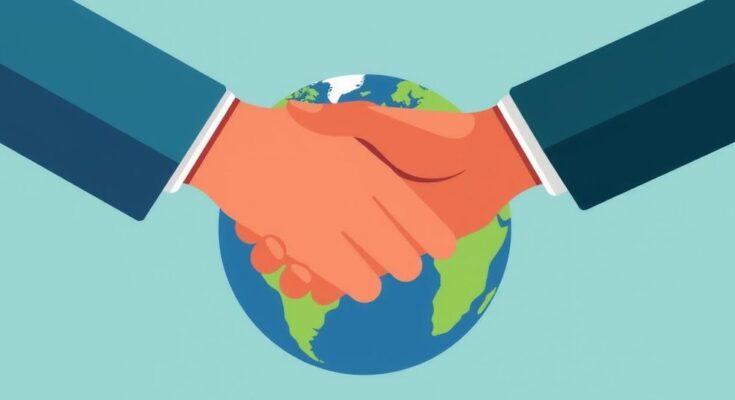External Affairs Minister S. Jaishankar highlighted the active trade discussions between India and the U.S., emphasizing the strong business case for a bilateral trade agreement. With the upcoming U.S. tariffs and ongoing negotiations regarding strategic defense and energy ties, both countries aim to solidify their economic relationship while addressing concerns about agricultural market access. India seeks to leverage these talks to enhance its trade agreements globally, particularly with the European Union and the UK.
On March 27, 2025, Indian External Affairs Minister S. Jaishankar announced that India and the United States are engaging in “very active” and “intense” trade discussions amid anticipation of U.S. President Donald Trump’s reciprocal tariff, set to take effect on April 2. In a session organized by Asia Society, Mr. Jaishankar emphasized the robust business case for a bilateral trade agreement (BTA) between the two nations but refrained from predicting immediate outcomes for the ongoing negotiations.
Following discussions between Prime Minister Narendra Modi and President Trump last month, both countries plan to initiate the first stage of BTA negotiations by fall 2025. Mr. Jaishankar remarked on the current momentum, stating, “There’s a very active and intense trade discussion going on at this point of time” during the session moderated by Kyung-wha Kang, President and CEO of the Asia Society.
Currently, Brendan Lynch, Assistant U.S. Trade Representative for South and Central Asia, is visiting India to facilitate discussions. Mr. Jaishankar indicated that while it remains unclear if discussions regarding a tariff waiver for India will occur before the tariffs are enacted, the bilateral dialogue remains constructive. He noted that, despite some reservations, he believes the negotiators are well-positioned to achieve a favorable agreement between India and the U.S.
Addressing concerns about opening India’s agricultural markets, Mr. Jaishankar asserted that while challenges may arise, they should not pose insurmountable barriers given the compelling business rationale for a BTA. He also mentioned India’s ongoing negotiations for separate free trade agreements with the European Union and the United Kingdom, which are progressing well.
Regarding strategic partnerships, Mr. Jaishankar conveyed his expectations for a more substantive defense cooperation under the Trump administration, highlighting a positive shift in the U.S. approach towards sharing technology. Furthermore, he noted the intention to enhance energy ties, ensuring a stable and predictable energy landscape crucial for India’s development. India has universal ties with the U.S. as a major supplier of liquefied natural gas (LNG).
In light of President Trump’s trade strategies, characterized by “America First,” fears of an escalated global trade war have arisen, prompting countermeasures from various nations. To mitigate tensions and potentially lower tariffs, India recently announced reduced tariffs on specific imports in its Union budget for 2025-26. Meanwhile, the U.S. urges India to increase purchases of American commodities to reduce the significant trade deficit, which stands at approximately $45 billion in India’s favor.
As of 2023, the U.S. was India’s largest trading partner, with a total trade volume of $190 billion, and it ranked as a significant source of foreign direct investment, underscoring the importance of these bilateral discussions.
The current negotiations are set against a backdrop of India’s efforts to liberalize trade agreements with key partners, as well as its strategic positioning within the global economic framework, which is increasingly shaped by these evolving U.S.-India relations.
In conclusion, India and the United States are actively engaging in comprehensive discussions aimed at establishing a bilateral trade agreement, amidst challenges posed by forthcoming tariffs. Minister Jaishankar remains optimistic about reaching a beneficial outcome while addressing various concerns, especially regarding agriculture. Additionally, the enhancement of energy and defense ties further cements their strategic partnership as they aim to navigate the complexities of global trade relations in the current political climate.
Original Source: www.thehindu.com




